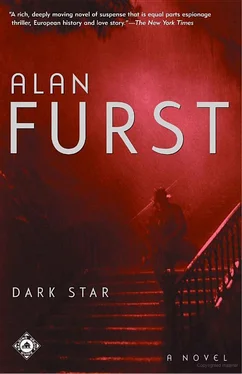Alan Furst - Dark Star
Здесь есть возможность читать онлайн «Alan Furst - Dark Star» весь текст электронной книги совершенно бесплатно (целиком полную версию без сокращений). В некоторых случаях можно слушать аудио, скачать через торрент в формате fb2 и присутствует краткое содержание. Жанр: Шпионский детектив, на английском языке. Описание произведения, (предисловие) а так же отзывы посетителей доступны на портале библиотеки ЛибКат.
- Название:Dark Star
- Автор:
- Жанр:
- Год:неизвестен
- ISBN:нет данных
- Рейтинг книги:3 / 5. Голосов: 1
-
Избранное:Добавить в избранное
- Отзывы:
-
Ваша оценка:
- 60
- 1
- 2
- 3
- 4
- 5
Dark Star: краткое содержание, описание и аннотация
Предлагаем к чтению аннотацию, описание, краткое содержание или предисловие (зависит от того, что написал сам автор книги «Dark Star»). Если вы не нашли необходимую информацию о книге — напишите в комментариях, мы постараемся отыскать её.
Dark Star — читать онлайн бесплатно полную книгу (весь текст) целиком
Ниже представлен текст книги, разбитый по страницам. Система сохранения места последней прочитанной страницы, позволяет с удобством читать онлайн бесплатно книгу «Dark Star», без необходимости каждый раз заново искать на чём Вы остановились. Поставьте закладку, и сможете в любой момент перейти на страницу, на которой закончили чтение.
Интервал:
Закладка:
Early the following morning, sleepless and pale, he stood in a long line at the central post office. When he reached the grilled window he handed over a cable to be wired to de Montfried’s office in Paris. He had an answer twenty-four hours later, was directed to a street of private banks where, beneath a vast, domed ceiling that assured a cool and perpetual dusk, a group of men in striped pants counted out thousands of French francs. Outside, Szara blinked in the hard sunlight and made his way to the office of the Denizcilik Bankasi, the Turkish Maritime Lines, a venerable institution that had been calling at the ports of the Mediterranean for over a century. The clerks were deeply understanding. This French patriot would return to his homeland, sailing in a first-class stateroom to face his destiny in war. Each in turn, they shook his hand and looked into his eyes, then pointed out a hallway that led to the baggage room. Here too he found sympathy. A supervisor stood with hands clasped behind his back and watched as his young assistant wrote out a claim ticket. With ritual care, a tag was tied to the handle, then the supervisor tapped a bell and a man in a blue uniform appeared and carried the valise away. Szara got a glimpse of the baggage room when he opened the door; sturdy, wooden shelves climbed to the ceiling. He saw old-fashioned Gladstones, steamer trunks, portmanteaus, wooden crates, even a few metal dispatch boxes with stenciled printing. The supervisor cleared his throat. “Do not trouble yourself,” he said. “The trust of our clients is sacred, and this we maintain, even in the most difficult times.” Then he added, “Good luck. Godspeed.” The German attack on France had flowed through the city like a current; war was now certain, it would surely be worse than 1914. All the citizens of Izmir Szara encountered that day were very formal and dignified; it was their particular way with tragedy.
He sailed on 14 May and reached Marseille five days later. On the voyage he kept to his cabin and had his meals brought up by the steward. Even though future sailings had been suspended, there were few travelers on the ship, only those who felt they had to return to a country at war. By the time they docked, Antwerp had been captured and the Wehrmacht had taken Amiens. Szara’s steward told him confidentially that some of the passengers felt it was already too late, and they had decided not to disembark in France. The customs and passport officials took care of the first-class passengers in their staterooms. They asked no questions of Jean Bonotte-there could be only one reason he was returning to France.
He was in Geneva a day later, traveling by hired car because the trains had become impossible, many of the locomotives and wagonslits shifted north under French military control. Jean Bonotte was admitted to Switzerland on a five-day visa, in order to take care of banking business that had to be seen to in person. Again he wired de Montfried, again de Montfried responded immediately, and once again he was directed to a street of private banks. In this instance, the bankers were replaced, in an elaborately furnished sitting room, by attorneys. There were muted introductions, the fine weather was acknowledged, then the concept of intervention -a soft, subtle, even a graceful expression when purred a syllable at a time in French- was permitted to enter the conversation. Evidently it meant that certain officials would decide to intervene in Jean Bonotte’s favor, for there could be no question but that he was the very sort of gentleman who should be resident in Switzerland. Szara said almost nothing; the Bonotte who sat at the table was virtually ignored, it was Bonotte the legal entity with whom they concerned themselves. These were gifted attorneys, with voices like cellos, who did not exactly ask questions; instead they provided answers, phrasing them for courtesy’s sake in the interrogatory mood: “Wouldn’t it be much the best idea to inform the Prefecture that …” Szara followed along as best he could. Soothed by the distant clacking of typewriters, warmed by the sun pouring in a leaded-glass window, he might have fallen asleep if, every now and again, someone hadn’t flourished a paper that needed signing. This is how, he thought, you climb over barbed wire without cutting your hands.
And so, it began again.
An eternal craft, Szara realized, in this warm and gray and placid city where the Rhone surged gently beneath stone bridges. Concessions were granted, money was earned, interest compounded, statements mailed in hand-addressed envelopes, and intelligence acquired, sold, traded, or simply locked away for later use. The city wasn’t about secrecy, it was about privacy. Coat collars were worn flat. Szara found the usual small villa in the usual bland neighborhood, on the chemin de Saussac, south of the city, and set aggressively about minding his own business, soon enough disappearing into the shadows of the daily and the expected. With his neighbors, he practiced the single, stiff nod-no more, no less. He bought three brown suits, just barely different enough so the world might know he had more than one. Established a bank account, paid his bills, vanished. “A most orderly and dignified city,” wrote the phantom B from Zurich. Something not unlike nostalgia attended Szara’s hours on the train-all that effort to avoid a Geneva postmark while letting her know he was safe in Switzerland.
Safe was, of course, a relative term. He remained a fugitive. But somewhere, in his long odyssey through the back streets of southern Europe, Szara had learned to put aside his fear of inevitable retribution. Now he only hoped that if the NKVD discovered him he would not be kidnapped and interrogated. If they were going to kill him, let them get it over with quickly. He maintained some features of his previous disguise, in defense of chance recognition more than anything else. A woman journalist he knew, a Belgian, stared at him on a street one day. Szara acted like a man receiving an unexpected, though not at all unwelcome, sexual advance, and she hurried off. On another occasion an unknown man spoke to him, hesitantly, in Russian. Szara looked puzzled and asked, in French, if he needed assistance. The man apologized with a little bow and turned away. What helped to protect him, Szara felt, was the attitude of the Swiss government toward the NKVD; the Soviet defector Ignace Reiss had been gunned down, quite openly, by NKVD operatives in Switzerland in 1937. The Swiss didn’t like that sort of thing at all. What the Russians now maintained, he guessed, were quiet diplomatic affiliations and a few OPAL-style networks using former Communist party members as agents. Moscow thought it best to respect the limits of Swiss patience-any tolerance for revolutionary activity had long ago disappeared. The young Jews in flight from the Pale no longer argued the nights away-Hasidism! Socialism! Bolshevism! Zionism! — in Geneva cafes. Lenin, leaving exile in Switzerland in 1917, had left no statues of himself behind, and the Swiss seemed in no hurry to install them.
It would now be necessary to go to war.
This was his obligation, his heritage, it required no justification. “I need,” Von Polanyi had said, “a man who can do good and not get caught at it.” Very well, Szara was that man. In his desk drawer was the address of a certain drapery shop in Frankfurt. To complete the connection, he needed only a poste restante address, and this he obtained in Thonon, a pleasant train ride up the southern shore of Lac Leman. A communication line was now established out of Germany.
As to where Von Polanyi’s information would go next, that depended on what he provided, and it was clearly Szara’s choice to make: Geneva was rich with possibilities. Carefully, quietly, Szara built an inventory of candidates. The obvious-French and British political officers-and the not so obvious. Szara made contact with organizations interested in progressive political causes. He used the library, read old newspapers, identified journalists with strong contacts within the diplomatic community. Through one of de Montfried’s attorneys, he managed an introduction to one of them, now retired, who had written about the Swiss political world with extraordinary insight. He took a vanilla cake and a bottle of kirschwasser to the man’s home and they spent the afternoon in conversation. Yes, information was considered a crucial resource in Switzerland, a good deal of buying and selling went on. A certain Swedish businessman, a French oil executive, a professor of linguistics at the university. On hearing the last, Szara feigned surprise. The old journalist grinned. “A terrific communist in the old days, but I guess he saw the light.” The look on the man’s face- cynical, amused-told Szara everything he needed to know. He’d turned up the corner of a network.
Читать дальшеИнтервал:
Закладка:
Похожие книги на «Dark Star»
Представляем Вашему вниманию похожие книги на «Dark Star» списком для выбора. Мы отобрали схожую по названию и смыслу литературу в надежде предоставить читателям больше вариантов отыскать новые, интересные, ещё непрочитанные произведения.
Обсуждение, отзывы о книге «Dark Star» и просто собственные мнения читателей. Оставьте ваши комментарии, напишите, что Вы думаете о произведении, его смысле или главных героях. Укажите что конкретно понравилось, а что нет, и почему Вы так считаете.












